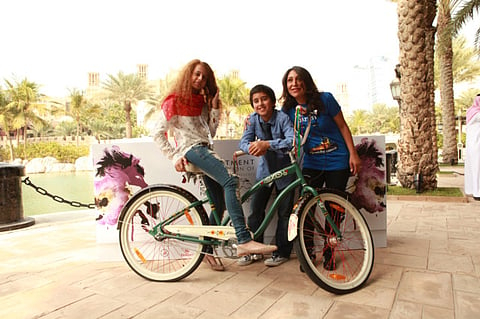'Wadjda': Aiming for change without conflict
First Saudi woman director says she doesn’t fear controversy but doesn’t seek it either

As the first Saudi Arabian woman to direct a feature film, Haifaa Al Mansour should be hailed a pioneer. But that’s not what she wants.
“I do not fear controversy but neither do I seek it,” said the director who at times was forced to hide in a production van, directing her male crew members via walkie-talkie for fear of sparking protests.
“To me controversy is healthy,” she continued. “Saudi Arabia is a very traditional, conservative and tribal society. I know I live in a place with certain boundaries which should be respected. But I don’t want to start a revolution or want to be seen that way. I just want to make films which reflect me and my culture.”
Wadjda, debuted in the Middle East with a gala screening at the Dubai International Film Festival attended by Haifaa along with child stars Waad Mohammad and Abdullrahman Al Gohani who play lead roles in the film.
Funded by German money as well as a $100,000 (Dh367,320) prize from the former Abu Dhabi-based Middle East International Film Festival back in 2006, Mansour’s film uncovers the role of women in Saudi society, a place where cinema theatres are banned.
Waad plays the title character, a rebellious 11-year-old girl who enters a local Quran-reading competition, planning to use the prize money to buy herself a bicycle.
“Women are always revolting in Saudi Arabia,” said Haifaa “I wanted to use the innocence of children to portray something serious but without starting a conflict. My plan is not to move people to start using big words like revolution. I wanted to show the human face of what is happening in Saudi. The situation for women is not the best and it has to improve. But I certainly didn’t want to speak a language which leaves us looking like victims. I wanted success for Wadjda. She’s a girl who finds her voice. A character who drives us ahead.”
Haifaa grew up in a small Saudi town as one of 12 siblings and said her parents were always very supportive of her career even though they came under pressure from relatives who said filmmaking was not something a woman should be doing. Born in 1974, Haifaa, who studied literature at the American University in Cairo and film at the University of Sydney, has directed three short films and the award-winning documentary Women Without Shadows about women in the Gulf.
“The fact that we shot a film in Saudi Arabia with permission and everything says a lot about the country. It says the country is embracing art,” she said. “Things are slowly changing.”
Young Waad had her own battles to fight before being allowed to take part in the film as her mother originally banned her from taking part.
“She said no at first,” said the curly-haired Saudi girl. “But I kept asking and eventually she let me,” she continued with a big smile.
Haifaa said finding financing also posed a problem in a country where cinemas are officially banned and any film is considered a commercial risk. As a result Wadjda will only be available in the kingdom on DVD or on television.
With little or no film industry, Haifaa has beaten the odds in many ways including training as she has never had the opportunity to work on film sets and get valuable training.
Her film has already been snapped up for distribution in Germany, Switzerland and France, with further purchases expected this week.
Sign up for the Daily Briefing
Get the latest news and updates straight to your inbox



